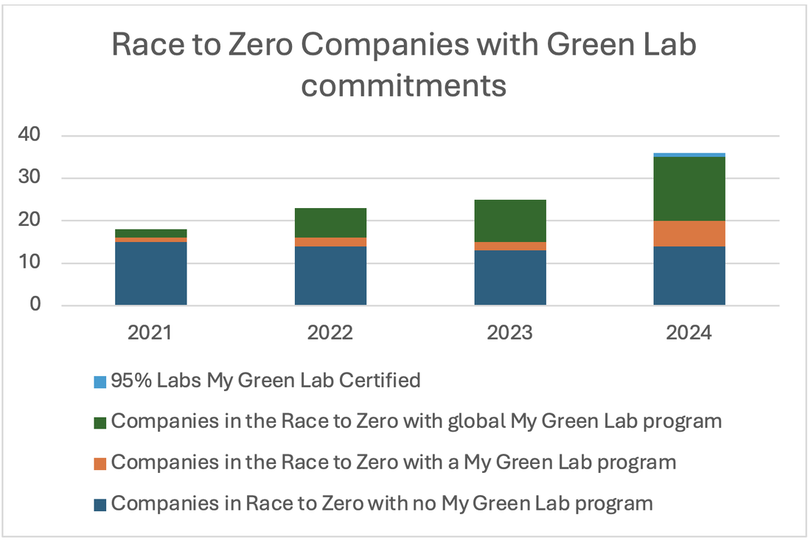
My Green Lab’s 2024 report reveals growing climate commitments from the biotech and pharma sectors while underscoring the urgency of accelerating Scope 3 emissions reductions.
The biotech and pharma industry plays a pivotal role in advancing global health, but as a significant contributor to climate change, its environmental footprint cannot be ignored. My Green Lab’s 2024 Carbon Impact of Biotech & Pharma Report highlights progress while calling for deeper systemic changes as the industry approaches a pivotal moment in its sustainability journey. As climate goals become more urgent, biotech and pharma companies are uniquely positioned to drive by decarbonizing their supply chains and aligning with global climate targets.
The report, produced by My Green Lab with contribution from Intercontinental Exchange (ICE), indicates that the industry has reached a tipping point — with over 25% of companies setting medium-term Scope 1 and 2 targets aligned with a 1.5°C pathway. Released during COP 29 in November 2024, the study highlights notable successes, including more companies than ever before adopting the UN Race to Zero. Additionally, a majority of companies in the campaign have made progress on the Breakthrough Outcome by adopting My Green Lab Certification, with nearly three-quarters of those programs operating on a global scale.
Despite significant progress, the report finds that long-term progress hinges on targets expanding to include Scope 3, the indirect emissions from upstream and downstream a company’s value chain. Expanding these targets to include the hard to measure and reduce Scope 3 emissions are essential to ensure alignment across the industry and supply chain to a 1.5°C trajectory
This year’s report builds on previous reports starting in 2021 which were the first to assess the entire biotech and pharma value chain by quantifying Scope 3 emissions. This year’s report, which leverages data from 638 publicly listed companies and 290 privately held companies, tracks emissions since 2015, offering the comprehensive overview of the industry’s carbon footprint and its alignment with the Paris Climate Agreement.
Key Findings and Industry Progress
Emissions Challenges and Commitments
The 2024 report highlights both significant progress and challenges in emissions reduction across the biotech and pharma sectors. Among the 149 biotech and pharma companies with high-quality emissions data, 31% have set medium-term Scope 1 and 2 targets (2026–2035) that are aligned with a 1.5°C pathway. However, to fully meet climate goals, it is critical for companies to expand these targets to include Scope 3 emissions, which cover indirect emissions throughout the value chain.
The report also reveals a concerning emissions footprint across the industry. Total emissions from public companies amounted to 259 million tCO₂e, while private companies accounted for 138 million tCO₂e, bringing the total to 397 million tCO₂e in 2023. Scope 3 emissions, which encompass indirect emissions from purchased goods and services, are a major challenge. These emissions are significantly higher than Scope 1 and 2, being 5.4 times greater for public companies and 6.5 times greater for private companies.
Industry Progress and Initiatives
The growing commitment to the UN Race to Zero Campaign is a positive indication of progress. The study found that leading companies are accelerating their sustainability commitments, with 36 companies—representing 56% of the sector’s revenue—joining the UN’s Race to Zero campaign, up from 28 companies (46% by revenue) in the previous year. The campaign’s Breakthrough Outcome target is also within reach, with 61% beginning My Green Lab Certification programs, 73% of which are operating at a global scale.

As the report highlights, Scope 3 emissions make up 79% of indirect emissions, underscoring the critical role of supply chain innovation in achieving climate goals. In response, the industry has launched a suite of collective supply chain initiatives aimed at addressing Scope 3 emissions, which have shown significant progress over the past year. Programs such as Converge, Activate, and Energize are driving decarbonization by engaging suppliers to adopt renewable energy, improve operational efficiency, and pursue sustainable lab practices.

Why Download the 2024 Report?
The 2024 report offers a strategic guide for biotech and pharma companies to align with a 1.5°C future. It highlights key challenges, celebrates progress, and outlines actionable solutions for reducing emissions across the value chain. Whether you’re a scientist, lab manager, policymaker, or executive, this report provides essential insights to drive sustainable science.
